
PLANT SPECIES BIOLOGY
Scope & Guideline
Exploring the Intricacies of Plant Species and Ecosystems
Introduction
Aims and Scopes
- Biodiversity Conservation:
Research on strategies and methodologies for conserving plant biodiversity, particularly in response to environmental changes and human impacts. - Reproductive Biology and Pollination Ecology:
Investigation into the reproductive mechanisms of plants, including pollination strategies, floral traits, and reproductive success in various ecological contexts. - Population Genetics and Phylogeography:
Studies examining genetic diversity and structure within and between plant populations, providing insights into evolutionary processes and conservation needs. - Germination and Seed Ecology:
Exploration of seed dormancy, germination processes, and ecological factors influencing plant establishment and survival. - Functional Traits and Ecosystem Interactions:
Analysis of plant functional traits and their roles in ecosystem dynamics, including interactions with herbivores, pollinators, and other plants.
Trending and Emerging
- Climate Change Impacts on Plant Traits:
An increasing number of studies are investigating how climate change affects plant morphology, reproductive success, and ecological interactions, underscoring the importance of this theme in contemporary research. - Invasive Species and Their Ecological Consequences:
Research on invasive plant species, including their reproductive biology and impacts on native flora, is gaining prominence as global biodiversity challenges intensify. - Genetic and Genomic Approaches to Conservation:
There is a growing trend towards employing genetic and genomic tools to inform conservation strategies and understand plant population dynamics. - Functional Trait Plasticity and Adaptation:
Emerging studies focus on how functional traits of plants adapt to varying environmental conditions, emphasizing the role of plasticity in survival and reproduction. - Interdisciplinary Approaches Integrating Ecology and Evolution:
The integration of ecological and evolutionary perspectives is increasingly evident, fostering a holistic understanding of plant biology and conservation.
Declining or Waning
- Traditional Taxonomy and Morphology Studies:
Research centered on classical taxonomy and morphological descriptions of plant species has decreased, possibly due to a growing emphasis on genetic and ecological approaches. - In-depth Studies on Non-Vascular Plants:
There has been a notable reduction in publications focusing on non-vascular plants such as mosses and liverworts, suggesting a shift towards vascular plant species in research priorities. - Purely Descriptive Studies:
The frequency of purely descriptive studies lacking experimental or comparative analyses has declined, in favor of more integrative approaches that combine multiple lines of evidence.
Similar Journals
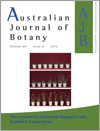
AUSTRALIAN JOURNAL OF BOTANY
Fostering innovation in plant biology and conservation.The Australian Journal of Botany is a prestigious peer-reviewed journal published by CSIRO PUBLISHING, dedicated to advancing the field of plant sciences and ecology. Established in 1953, this journal provides a critical platform for researchers to share original research findings, reviews, and perspectives in subjects ranging from plant biology to ecological interactions, with a focus on Australian flora and its conservation. With an impressive impact factor and categorized in the Q3 quartile in both Ecology, Evolution, Behavior and Systematics and Plant Science, the journal ranks competitively within its fields, allowing authors to reach a diverse audience of professionals, students, and fellow researchers. The journal is accessible in print and electronically through its ISSN: 0067-1924 and E-ISSN: 1444-9862, providing wider access to vital research outcomes that influence environmental policies and natural resource management. As it aspires towards innovation and excellence, the Australian Journal of Botany remains an essential resource for those passionate about the richness of plant biodiversity and ecological understanding.
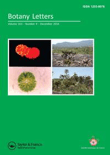
Botany Letters
Connecting Researchers to Transform Plant ScienceBotany Letters, published by Taylor & Francis Ltd, is a prominent journal in the field of Plant Science based in the United Kingdom. With its ISSN 2381-8107 and E-ISSN 2381-8115, the journal has established itself as an essential resource for researchers, professionals, and students alike, focusing on innovative studies and findings in botany. As a Q2 ranked journal in its category (2023) and holding a respectable Scopus rank of #200 out of 516 in Agricultural and Biological Sciences, it reflects a robust commitment to quality and relevance in the field. The journal's open access model ensures that groundbreaking research is readily accessible, fostering collaboration and knowledge sharing among the global scientific community. Covering a broad spectrum of topics within plant science from 2016, Botany Letters aims to catalyze advancements in the understanding and management of plant biodiversity and sustainability, ultimately contributing to conservation efforts and agricultural innovation.
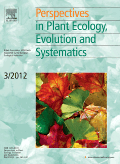
PERSPECTIVES IN PLANT ECOLOGY EVOLUTION AND SYSTEMATICS
Exploring the Interconnectedness of Ecology and EvolutionPERSPECTIVES IN PLANT ECOLOGY, EVOLUTION AND SYSTEMATICS is a premier scientific journal published by Elsevier GmbH, dedicated to advancing knowledge and understanding in the fields of plant ecology, evolution, and systematics. With an impressive impact factor and a solid reputation within the top quartile (Q1) of both Ecology and Plant Science categories, this journal ranks among the elite, positioned 100th out of 721 journals in its field, reflecting its significant contribution to ongoing research and academic dialogue. Established in 1998 and converging through to 2024, this journal not only serves as a crucial platform for researchers, professionals, and students alike but also emphasizes innovative methodologies and interdisciplinary approaches to address pressing environmental issues. Although it follows a traditional access model, the wealth of rigorous peer-reviewed articles available will engage the scientific community and facilitate advancements in understanding plant diversity and ecological interactions.
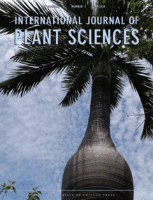
INTERNATIONAL JOURNAL OF PLANT SCIENCES
Cultivating excellence in plant research and publication.The INTERNATIONAL JOURNAL OF PLANT SCIENCES, published by UNIV CHICAGO PRESS, is a leading journal dedicated to advancing knowledge in the fields of plant sciences and ecology. With an ISSN of 1058-5893 and an E-ISSN of 1537-5315, this journal has been a prominent platform for groundbreaking research since its establishment, featuring works from 1983 to present. It holds an impressive Q2 ranking in both Ecology, Evolution, Behavior and Systematics and Plant Science, reflecting its reputable standing within the academic community. The journal is well-regarded for its rigorous peer-review process and commitment to high-quality publication standards, making it a favored choice for researchers, students, and professionals eager to engage with the latest findings and innovative methodologies in plant research. While it does not currently operate under an Open Access model, the journal provides ample access options for institutions and individuals keen to explore its curated content. By presenting diverse studies that blend theoretical and practical insights, the INTERNATIONAL JOURNAL OF PLANT SCIENCES plays a critical role in fostering interdisciplinary dialogue and advancing the frontiers of plant science research.
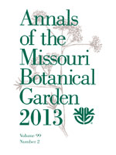
ANNALS OF THE MISSOURI BOTANICAL GARDEN
Unveiling Insights into Ecology, Evolution, and BehaviorANNALS OF THE MISSOURI BOTANICAL GARDEN is a prestigious, peer-reviewed journal published by the Missouri Botanical Garden, focusing on the rich disciplines of Ecology, Evolution, Behavior, and Plant Science. With a storied history dating back to 1946, this journal has evolved to become a significant platform for scholars and professionals to disseminate research that informs global understanding of plant biology and conservation. Ranked in the Q2 category for both Ecology and Plant Science in 2023, it boasts commendable standings within the Scopus rankings, placing it in the 66th percentile for Plant Science and the 65th percentile for Ecology, Evolution, Behavior, and Systematics. The journal's commitment to rigorous scientific standards ensures that it remains a vital resource for those seeking to explore vital ecological and botanical research. As a product of the esteemed Missouri Botanical Garden, the journal serves researchers, professionals, and students alike, encouraging collaboration and innovation in the plant sciences community.
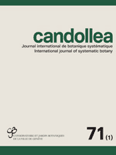
CANDOLLEA
Unlocking the Secrets of Ecosystems and Evolution.CANDOLLEA is a distinguished academic journal published by the Conservatoire et Jardin Botaniques Ville Genève, focusing on the fields of Ecology, Evolution, Behavior, Systematics, and Plant Science. With an ISSN of 0373-2967, this journal serves as a vital platform for researchers, professionals, and students aiming to deepen their understanding and contribute to the scientific discourse surrounding botanical research and ecosystem dynamics. Since its convergence in 2000, CANDOLLEA has trodden the path of scholarly excellence, currently residing in the Q3 quartile for both Ecology and Plant Science in 2023. Although it does not currently offer open access, the journal plays a critical role in disseminating valuable findings and innovative methodologies that shape contemporary ecological and botanical studies. The journal is located in Switzerland at CASE POSTALE 60, CH-1292 CHAMBESY, serving as a beacon for scholars dedicated to advancing their expertise in environmental and plant sciences.
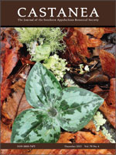
CASTANEA
Celebrating the Legacy of Plant Science Research Since 1982CASTANEA is a distinguished journal published by the SOUTHERN APPALACHIAN BOTANICAL SOCIETY in affiliation with NEWBERRY COLLEGE. With an ISSN of 0008-7475 and an E-ISSN of 1938-4386, this esteemed publication serves as a vital platform for researchers and practitioners in the field of Plant Science. It has been circulating since 1982, and its scope focuses on the study of trees, their ecology, and conservation, thereby contributing significant insights into the biodiversity of the Southern Appalachian region and beyond. Despite its current ranking in the Q4 quartile and the 5th percentile in the Scopus Agricultural and Biological Sciences category, CASTANEA is committed to advancing knowledge and fostering a deeper understanding of plant sciences among academics and students alike. The journal does not currently offer Open Access options, maintaining a traditional subscription model that allows for carefully curated and peer-reviewed content. As you explore the advances in plant biology through CASTANEA, you will find an invaluable resource that supports both emerging and established scholars in their research endeavors.

FOLIA GEOBOTANICA
Exploring the intricate connections between flora and fossil.FOLIA GEOBOTANICA, published by Springer, is a distinguished journal dedicated to advancing the fields of Paleontology and Plant Science through the dissemination of high-quality research. With an ISSN of 1211-9520 and an E-ISSN of 1874-9348, this journal has been pivotal in providing a platform for innovative studies from 1994 to 2024. Notably, FOLIA GEOBOTANICA holds a Q3 ranking in Paleontology and a Q2 ranking in Plant Science as of 2023, affirming its relevance and contribution to the scholarly community. The journal is located in the Netherlands at VAN GODEWIJCKSTRAAT 30, 3311 GZ DORDRECHT, and is not an Open Access publication, ensuring comprehensive review processes and scholarly integrity. With Scopus rankings that place it in the 50th percentile for Plant Science and 46th for Paleontology, FOLIA GEOBOTANICA continues to attract researchers, professionals, and students who are keen to explore the intricacies of plant ecology and fossil records, thereby fostering a deeper understanding of ecological and evolutionary patterns.
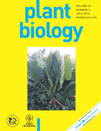
PLANT BIOLOGY
Elevating Understanding of Plant SystemsPLANT BIOLOGY is a prestigious academic journal published by Wiley, dedicated to advancing knowledge in the fields of plant science, ecology, and evolutionary biology. With an impressive impact factor and ranking in the Q1 category for Ecology, Evolution, Behavior and Systematics, and Plant Science as of 2023, it stands at the forefront of research dissemination. The journal encompasses a broad scope of plant biology topics, providing a critical platform for researchers to share innovative findings and foster interdisciplinary collaboration. Available in both print (ISSN: 1435-8603) and online formats (E-ISSN: 1438-8677), it ensures accessibility through open access options. As a crucial resource for professionals, researchers, and students alike, PLANT BIOLOGY cultivates a deeper understanding of plant systems and their ecological significance, making it an essential addition to the library of anyone dedicated to the study of biology and the environment.
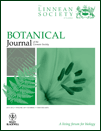
BOTANICAL JOURNAL OF THE LINNEAN SOCIETY
Cultivating Insights into Plant Biology and EcosystemsThe Botanical Journal of the Linnean Society, published by Oxford University Press, stands as a premier platform for interdisciplinary research within the realms of Ecology, Evolution, Behavior, and Plant Science. With a notable impact factor reflective of its esteemed reputation, this journal is classified in the Q1 quartile for both Ecology and Plant Science, placing it among the most influential publications in these fields. Since its inception in 1969, and with an anticipated convergence of research extending to 2024, it has become essential for scholars and professionals seeking to engage with cutting-edge studies, theoretical frameworks, and practical applications that drive our understanding of plant biology and ecological systems. The journal’s commitment to excellence is underscored by its robust Scopus rankings—achieving an impressive 83rd percentile in Ecology and a 82nd percentile in Plant Science. This makes the Botanical Journal of the Linnean Society a crucial resource for researchers, educators, and students alike, eager to advance their knowledge and contribute to the evolving discourse in botany and environmental studies.